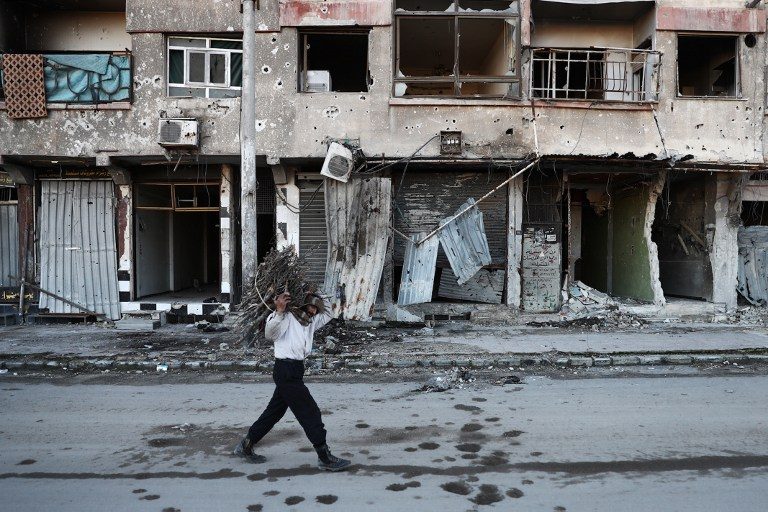SUMMARY
This is AI generated summarization, which may have errors. For context, always refer to the full article.

BEIRUT, Lebanon – A dozen Syrian rebel factions have suspended talks on new peace negotiations, accusing President Bashar al-Assad’s regime of violating a 4-day-old ceasefire with attacks near Damascus that continued Tuesday, January 3.
In the northwestern province of Idlib, an air strike killed at least 25 members of former Al-Qaeda affiliate Fateh al-Sham Front, including senior figures.
The rebels’ decision threatens the process sponsored by regime ally Russia and rebel backer Turkey, which began with a truce and is meant to lead to negotiations in the Kazakh capital Astana this month.
The ceasefire has brought quiet to large parts of the country but has been undermined by sporadic violence, particularly fighting in the Wadi Barada region north of Damascus that supplies the capital’s water.
Government forces backed by fighters from Lebanese Shiite movement Hezbollah continue to press a two-week offensive there, despite the ceasefire which began on December 30.
A dozen rebel groups announced late Monday, January 2, the “freezing of all discussion linked to the Astana negotiations”.
They said they had respected the ceasefire, but accused the regime of “major and frequent violations, notably in the (rebel) regions of Wadi Barada and Eastern Ghouta”, near Damascus.
“If things don’t return to how they were before, the accord will be considered null and void,” they said.
It was signed by a dozen groups, including the Army of Islam, Faylaq al-Sham and the Sultan Murad Brigade, which is close to Turkey.
‘Critical phase’
Fierce fighting in Wadi Barada continued Tuesday, the Syrian Observatory for Human Rights said.
Government forces used barrel bombs and artillery after advancing Monday to the outskirts of the Ain al-Fijeh spring, the area’s main water source, the Britain-based monitor said.
Regime shelling killed two civilians in Wadi Barada as well as one in the town of Douma, which is east of Damascus, it added.
The regime accuses rebels of deliberately damaging infrastructure, poisoning the water supply with fuel then cutting the flow to Damascus altogether.
Rebels say government strikes caused the damage, which has left 4 million people in Damascus without water since December 22.
The regime says Fateh al-Sham is in the area, a claim opposition fighters deny. Fateh al-Sham, along with the Islamic State (ISIS) group, is excluded from the truce.
The Observatory said an air strike by unidentified aircraft on Tuesday killed at least 25 Fateh al-Sham members including senior figures and at least four prisoners near Sarmada in Idlib province.
Fateh al-Sham, on its Telegram account, accused the US-led coalition of carrying out the raid.
An Agence France-Presse correspondent saw several strikes hitting the town including one on a Fateh al-Sham checkpoint.
Observatory director Rami Abdel Rahman warned the truce was in a “critical phase” and faced “collapse” if sponsors Russia and Turkey did not intervene to save it.
The monitor and Russia’s defense ministry reported on Tuesday dozens of ceasefire violations.
Spillover in Turkey
The ceasefire and planned talks are the latest effort to negotiate an end to Syria’s conflict, which has killed more than 310,000 people since it began with anti-government protests in March 2011.
Ankara and Moscow back opposing sides in the conflict but have worked closely of late, brokering a deal allowing civilians and rebels to leave Aleppo city before government troops seized it last month.
The UN Security Council has backed the Russian-Turkish efforts, despite them offering a competing track to UN-sponsored talks set to resume in Geneva in February.
Both Russia and Turkey have launched military interventions in Syria. Moscow entered on the government’s side in September 2015, while Ankara began an offensive against ISIS and Kurdish militants in August 2016.
The conflict has spilled into Turkey, with a string of deadly attacks claimed by or blamed on IS or Kurdish groups.
On Monday, January 2, ISIS took responsibility for a New Year’s attack on an Istanbul nightclub that killed 39 people. – Rappler.com
Add a comment
How does this make you feel?
There are no comments yet. Add your comment to start the conversation.